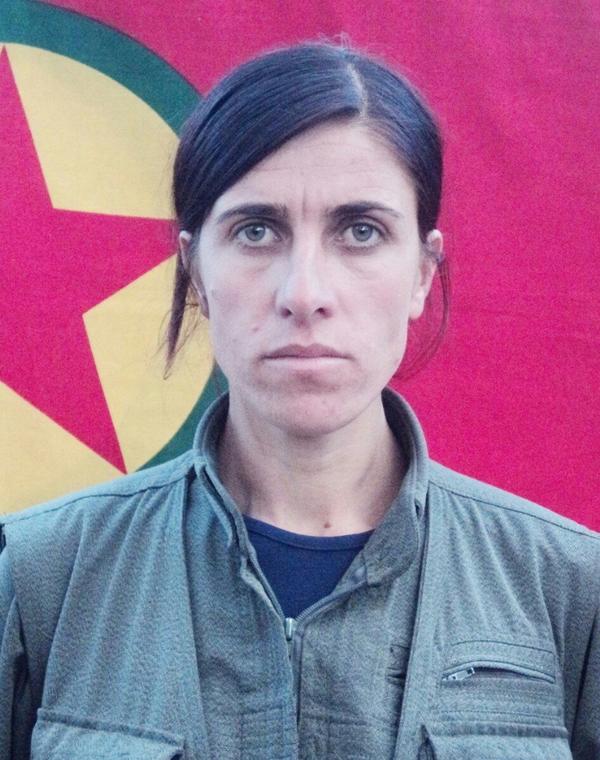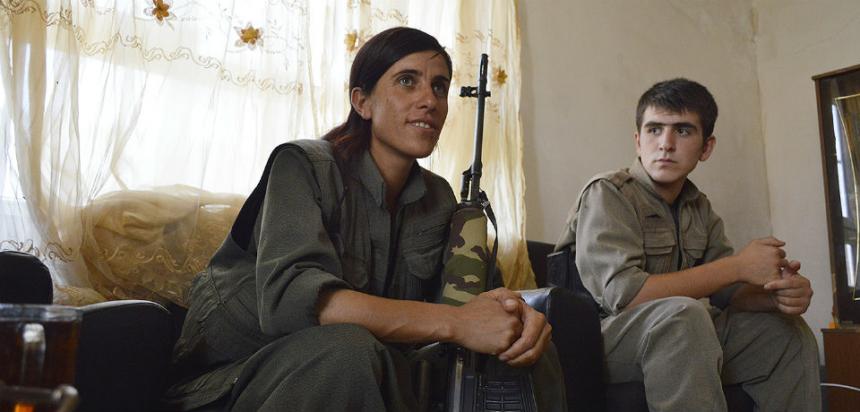Questo è l’articolo che la rivista “Foreign Policy” ha appena pubblicato. Riguarda una leader guerrigliera curda, Avesta, del Pkk. Ma mentre usciva l’articolo Avesta veniva uccisa in uno scontro con i miliziani dell’Isis. Ecco Foreign Policy:
DISPATCH
Meet the Badass Women Fighting the Islamic State
Guerrillas from Turkey’s Kurdistan Workers’ Party are on the front lines in northern Iraq. Many of the organization’s leaders, including 24-year-old Avesta, are women.
SEPTEMBER 12, 2014
MAKHMOUR, Iraq — Avesta enters the cramped room in a teachers’ residence turned temporary military base, ready for a meeting with her fellow fighters. The six commandos rise to shake her hand. She greets each individually. “Hello, heval,” she says, calling them by the Kurdish word for comrade. Then she lays down her Russian sniper rifle, and tea and coffee are served.
The Islamic State’s fearsome fighters are just around 10 miles away, but the Kurdish snipers, some still teenagers, are mostly relaxed. They debate the merits of drinking coffee versus tea, discuss the situation in the camp, and joke with each other. “You are very photogenic,” one of the fighterstells Avesta cheerfully as she poses for a photo. She smiles shyly as others burst into laughter.
Avesta is only 24, but she looks much older, with piercing gray eyes. Her long face is wrinkled and roughened; her hands are calloused. Her sniper rifle is at her side at all times; when it isn’t hanging from her back, it’s resting within arm’s reach — a constant companion to her uncertain life as a Kurdish guerrilla.
Avesta, whose nom de guerre is the same as the holy book of Zoroastrianism, a religion that Kurds consider as their original creed, commands a group of 13 fighters, eight of them female, from the Kurdistan Workers’ Party (PKK) — a rebel group that has fought the Turkish state for three decades in pursuit of Kurdish rights. They wear olive and gray uniforms of baggy pants and a vest, with a wide cloth belt around their waists.
Avesta’s squad arrived in Makhmour, a dusty town in Iraqi Kurdistan, by bus on Aug. 6 from a PKK base in the Qandil Mountains, a range that spans the Iraqi, Turkish, and Iranian borders. They are among the hundreds of Kurdish volunteers from around the region who have descended on Iraqi Kurdistan to fend off the vicious jihadists of the Islamic State.
Following a four-day battle that ended on Aug. 10, the Kurdish guerrillas retook control of their main target, a camp populated until early August by more than 10,000 Kurdish refugees from Turkey, many of whom are believed to be PKK supporters.
During the battle, Avesta used her sniper rifle to shoot at Islamic State fighters, providing cover for her comrades as they advanced toward the jihadists’ front lines. “They were not as capable fighters as their propaganda claimed,” she said. “They mostly fought from afar with heavy weaponry like mortars and artillery.”
Avesta is no stranger to heavy combat. The PKK has fought for three decades against the Turkish military, NATO’s second-largest. Avesta fought in major PKK battles against Turkey in 2012, 2008, and 2005. The PKK fighters are up for the challenge of the jihadists, she says. “The Islamic State fought rigorously. But it was not as severe as our previous fights with the Turkish army,” she said. “The Turks have warplanes and air power.”
Seeing the atrocities committed by the jihadists against Kurds in Sinjar and other areas, Avesta says she and others in her unit volunteered to be among the first group of PKK guerrillas sent to Makhmour. Her unit takes its orders from the PKK command in the Qandil Mountains. But on the ground in Makhmour, the unit also has some “limited” coordination with Iraqi Kurdish Peshmerga troops, Avesta says.
Like many who joined the PKK’s ranks, she was radicalized at a young age. The trigger came when she saw her brother’s mutilated body. He was a PKK fighter, too, and died in a clash with Turkish security forces in 2005. Shortly afterward, she left her hometown, Van, in Turkey’s southeast and headed to the mountains to take up arms. She was 15.
It was as a young woman in the rugged mountains of southeast Turkey and northern Iraq that Avesta says she discovered herself. “It was in the mountains that I found out women can be also powerful,” said Avesta. The ranks of the PKK, a Marxist organization, are filled with women, a rarity in the conservative cultures of the Muslim world. About half of the organization’s leaders are women. And the Kurdish guerrilla group stands in especially stark contrast to the radical fundamentalism of the Islamic State, which confines women’s role to mostly domestic tasks such as raising children, cooking, cleaning, and pleasing their husbands.
“It gives us strength and motivation when a woman like Avesta is our commander,” says Kendal, a 19-year-old male fighter in Avesta’s unit. “She gave us orders during the fighting and instructed us on tactics.”
The PKK and its Syrian affiliate, the YPG, played a crucial role in securing an escape route from Mount Sinjar, in Iraq’s western Nineveh province, all the way to Syria. Thousands of members of the Yazidi religious minority trapped on the mountain by the Islamic State fled to safety and returned to Iraqi Kurdistan through Syrian Kurdish territory. PKK fighters have also been deployed to Kirkuk, in northern Iraq, to boost Peshmerga lines.
But even if the presence of Avesta and her comrades in Iraq has helped beat back the Islamic State, other challenges lie ahead. For one, there are tensions with the Iraqi Kurds. Relations between the two groups have long been strained. The PKK and Iraqi Kurdish forces have fought each other on numerous occasions, from the late 1980s to the early 2000s. While Avesta said that the PKK liberated the refugee camp and played a major role in capturing the town of Makhmour from the Islamic State, Iraqi Kurdish officials insist that Iraqi Kurdish Peshmerga carried out the bulk of the fighting.
The PKK’s participation in the fight against the Islamic State has not yet stirred a strong reaction in neighboring Turkey. But given that Turkey considers the PKK a hostile organization and at the same time enjoys close political and economic ties with Iraqi Kurds, Ankara might not react favorably if the PKK decides to establish a long-term presence in Iraqi Kurdistan. A prolonged PKK presence in Iraqi Kurdistan — especially if the Islamic State is defeated in northern Iraq — could undermine the authority of the Kurdish government on its territory and give rise to tensions among Turkey, Iraqi Kurds, and the PKK.
The PKK presence could also raise red flags for the West, a critical ally to the Kurds, as the war against the Islamic State moves forward. The PKK is designated a terrorist group by the United States and a host of European countries.
Avesta shrugs off such designations. “We have been called terrorists for years,” she said while walking through the camp, returning from a quick tour of inspecting a guard post to make sure it is fortified in case the Islamic State attacks. “But we say to those countries: Come and see this war and then judge for yourselves.… The [Islamic State] beheads civilians.… We have rescued civilians.”
With Islamic State jihadists pushed out of the Kurdish areas around Makhmour, the guerrillas at the refugee camp have no plans yet to go back to their bases in the Qandil Mountains. For the time being, they are busy training some of the few hundred camp residents who have returned on how to protect themselves.
Experience has taught these fighters to take no chances. They have used their time since driving out the Islamic State to set up fortifications in and around the camp and at nearby Mount Qarachukh.
The PKK fighters take turns manning the checkpoints and fortifications. After her meeting with her comrades ends, she picks up her sniper rifle and bids them farewell. She and a male comrade get into a dusty car and head off to stand guard at the checkpoint at the camp’s entrance. From there, she can see the hazy horizon south of Makhmour, where the Islamic State still maintains a foothold.
UPDATE Sept. 13, 2:20pm: Avesta was killed on Sept. 12. According to a spokesperson for the PKK guerillas in northern Iraq, she was leading a unit in a joint PKK-Peshmerga operation to re-take a village near Makhmour when a bullet fired by an Islamic State militant struck her in the neck. She was put in a Peshmerga Humvee headed for the hospital in Makhmour that was struck by an improvised explosive device. She died soon after, on the way to Erbil, the capital of Iraqi Kurdistan, for further treatment.
Photo by Mohammed A. Salih



